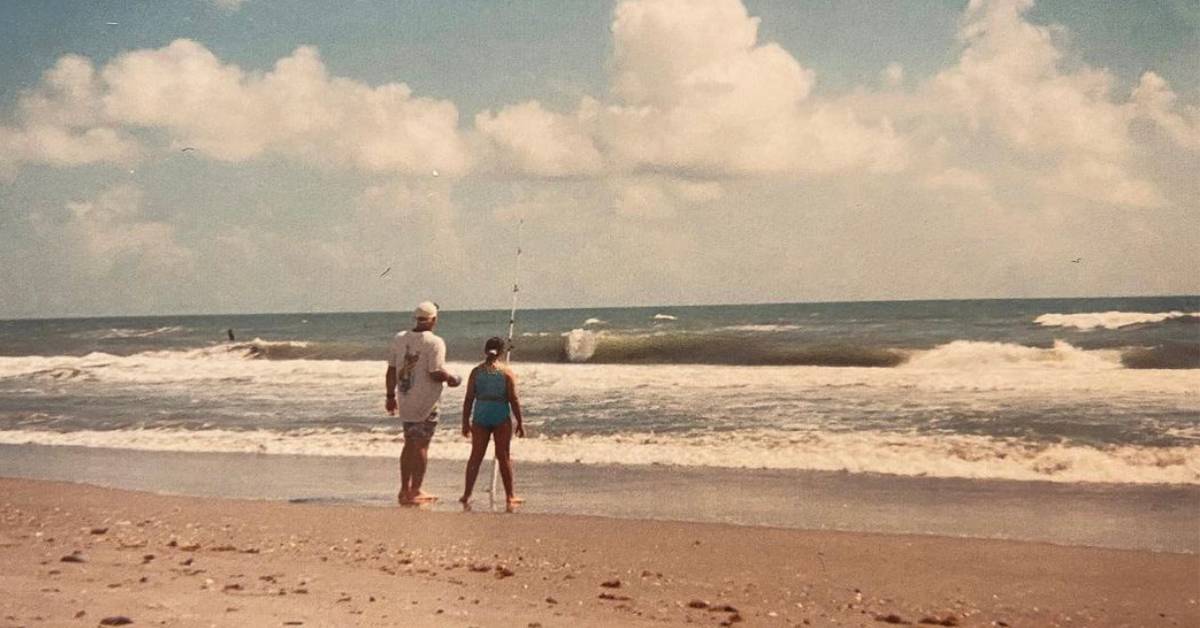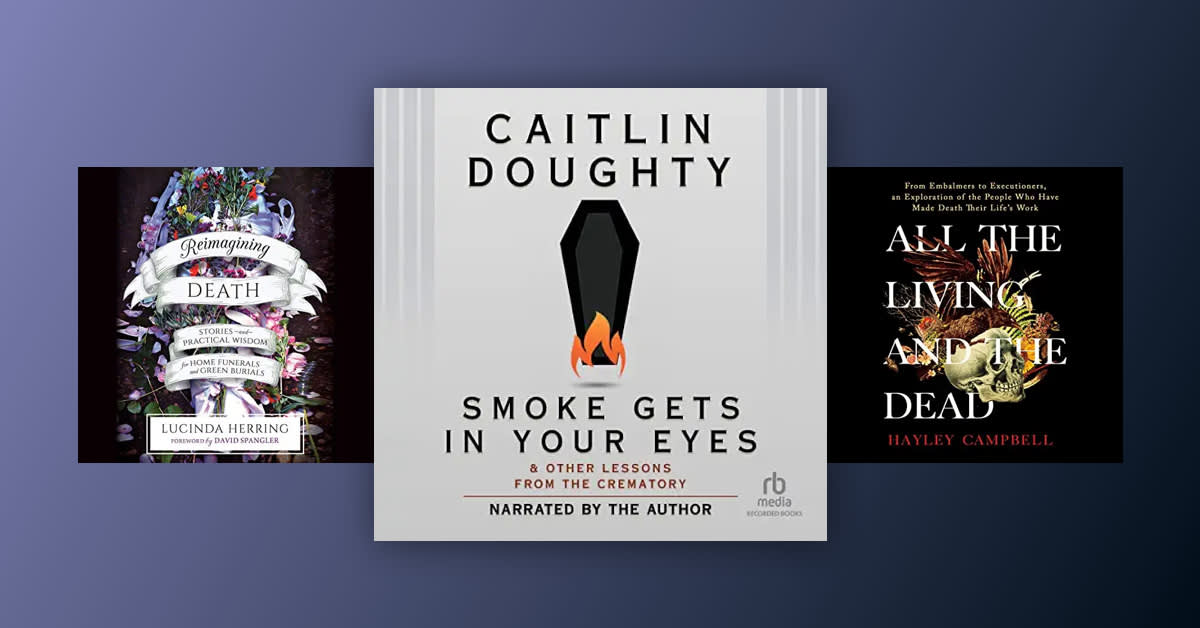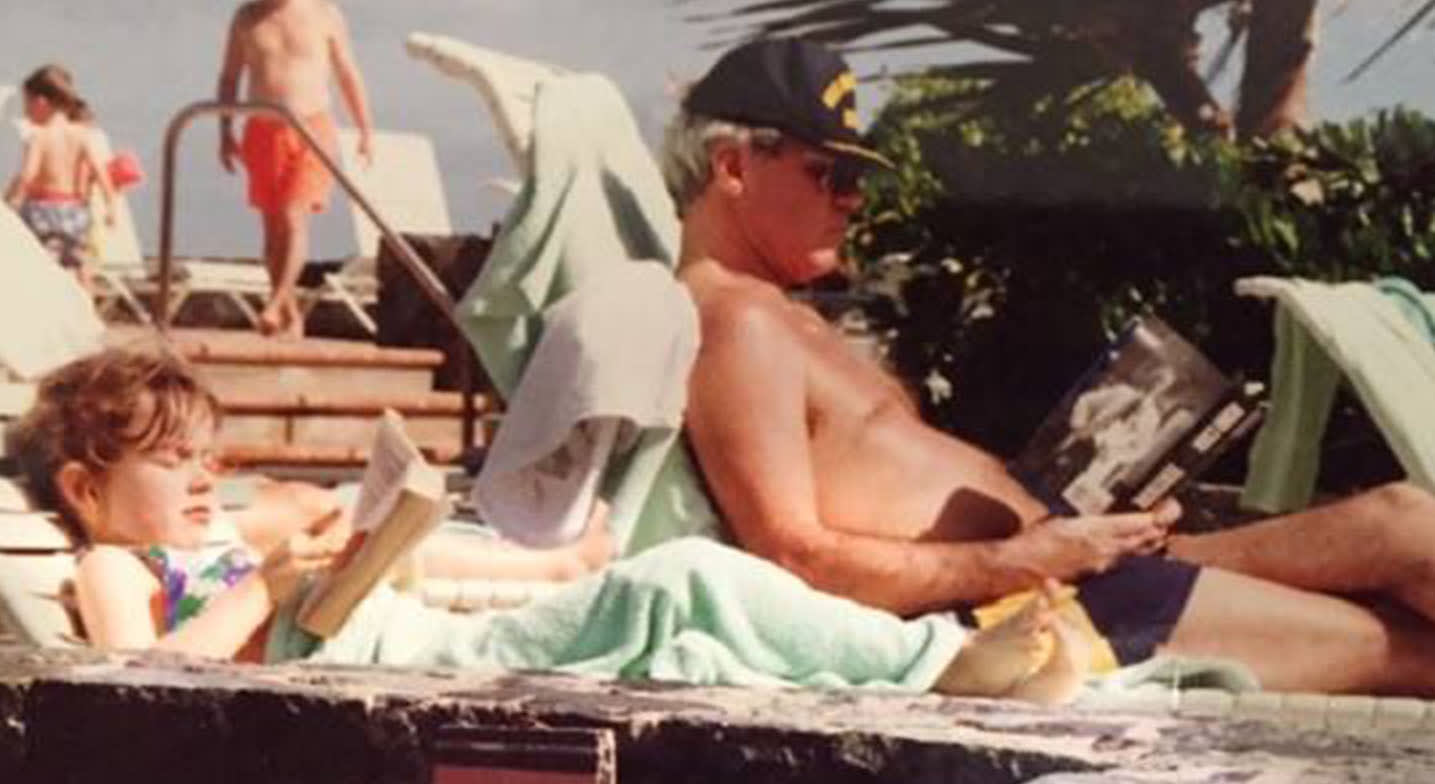Until six years ago, I viewed loss as an abstract, a compulsive, looping thought that had trailed me since adolescence. It was just a fear, I’d remind myself, something distant and inevitable, but not an imminent reality or an indicator of oncoming tragedy. Most of my peers had had some experience with death by their teen years—perhaps the loss of a family pet or an ailing elderly relative—but despite my anxieties and obsessive preoccupation with mortality, I made it to my 20s entirely unscathed.
And then, on an unceremonious afternoon in October, my father died suddenly, and my entire world was upended.
Grief is a sensorial experience. There was the gummy dry mouth taste that lingered after I shakily delivered my eulogy; the soft decay of floral arrangements and the scent of clothes still haunted by his cologne; the feeling of interlocked fingers steadying my trembling hands; the staggering sight of a funeral, a sea of black suits and swollen eyes. But above all and even still, long after the others have faded, it is the sounds of grief that remain, a quiet that's sometimes a gentle echo, like a rock skimming across the surface of a pond, and other times, an inescapable, cacophonic din.
In the weeks that followed my dad’s death, I found that my pulse quickened and eyes welled at the wail of an ambulance or any sound even remotely approximating the beep of hospital monitors. The three voicemails I had left from him, perfunctory messages checking whether I needed a ride or something picked up, felt sacred—though I could not bring myself to listen to them until years later, when I feared I had forgotten his voice entirely. Totally unsentimental classic rock hits would catch me off guard and leave me weeping in uncomfortably public locales: a bookstore, a baseball game, a collegiate a cappella performance.
And then, there were the silences.
Perhaps the greatest unsung pains of grief are those total voids of sound. For years, I had taken for granted the squeal of his ancient, perpetually stressed sedan, ever audible as he whipped it around the corner; the tinny sound of Garth Brooks echoing throughout the house from his phone’s speaker, replaced by a heavy, solemn quiet; his slippers squeaking on the floor as he did the twist in the kitchen, burning french toast while we spun around the linoleum, a sound I would never hear again.
The way he laughed and said my name, those goofy hemming-and-hawing noises he would punctuate a joke with—all irretrievably gone, fading alongside the sharpness of memories, edges blurred and uncertain. Then, of course, there was the most painful hush of all: never again hearing an expression of love, encouragement, or comfort.
Sometimes in moments of stillness, I’d sink into myself and try to conjure up these sounds, lost to death and time. I always seemed to come up short, unable to trust my recollection without confirmation or a point of comparison. These moments felt deeply unsettling: Could I really not recall the voice of the man who had helped raise me, a person so fundamental to who I am and the ways in which I express myself?
Yet, the sounds that comprised my dad's life were not found solely in the patterns of his speech. He, like all of us, was a culmination of all he'd ever loved and experienced, and my memories of him were not bound to auditory cues, but rather, unlocked by them. As time passed, I began to find comfort in lieu of torment in those things, big and small, that feel like reminders of him. Occasionally, I'll catch a phrase or a delivery that felt distinctly his and I'll feel lighter, more whole; other times, I'll be flooded by the sounds of things he cherished—the crackling of a barbecue grill, the cries of a circus barker, or the triumphant flare of the Monday Night Football theme—and for a moment, it's almost like he never left. I'm not a spiritual person, but when I'm riding in the passenger seat, windows down, listening to our favorite radio station, the one we tuned in to every single day on the ride home, I know he's somewhere near, even if it’s just left behind in some part of me.
All this is to say: Grief is complicated and messy and painful and frustratingly unique to each and every individual who has experienced loss. There is not a one-size-fits-all balm for that which can feel insurmountable, even unsurvivable. But when you're ready, I've found that embracing all of the sounds that made your loved one who they were—and healing from those noises so associated with the moments in which they were lost—can bring you a little closer to that memory, sometimes so close it can feel like they're still there.
In the early months after my father’s passing, there were some seemingly innocuous sounds that I couldn’t bear, reminders of our favorite pastimes that left me scrabbling to lower the volume. Needless to say, when Adam Savage—one of the hosts of Mythbusters, chief among my dad’s favorite shows—released his author-narrated memoir in 2019, I was initially devastated: It would have made the perfect Christmas gift for a person who no longer existed. But listening to a familiar voice (one that reminded me of after-school marathons, my dad and I parked on the couch, dipping stale grocery-store oatmeal cookies into an oversized jar of peanut butter) was a peculiar comfort that cut through the loneliness of loss.
So many of my memories of my father are inextricable from the sound of the ocean. I grew up in a small coastal neighborhood, where my dad taught me how to swim in the fairly stoic waves of the local beach, and, when I was young, we took yearly summer trips to my grandparents’ home, just steps away from the sand, on Florida’s Space Coast. The lull of the ocean, with its gentle crashing and receding whooosh, and the chirp of seabirds and chittering of bugs immediately evoke memories of what feels like home: chasing sandpipers and dashing across hot sand to the relief of the shore. And if I listen closely, I can almost picture him there, lounging in a half-broken beach chair, smiling wide at the wild, wonderful world we were lucky enough to share.
My father was a total bibliophile—I remember downloading book after book to his Kindle (a task that he thought portrayed some deep technological prowess) and browsing the shelves with him at the public library. He loved nonfiction from writers like Mark Kurlansky, fast-paced thrillers from David Baldacci, and the speculative works of Michael Crichton, but among his favorites was Nathan Philbrick’s In the Heart of the Sea, a true tale of disaster-at-sea beset by the horrors lurking in the waves and man's determination to survive. I've come to understand that maybe my dad was right to steer me away from pilfering this one off his bookshelf when I was a kid, but to listen as an adult feels like we're sharing something anew in spite of his absence.
In the direct wake of my father’s death, the words “I’m sorry for your loss,” morphed into a series of noises without meaning. Some condolers attempted to address the situation pragmatically, encouraging me to move past it as quickly as possible, equating strength with a lack of feeling; others assured me he was in a “better place,” a phrase that both confused and vexed me—what better place than here, with us? Though I knew they were well-intentioned, these phrases were disorientating and upsetting at a time when I needed comfort and stability. As this collection conveys, guiding someone through a period of grief is almost as impossible as experiencing it yourself. But pushing through that initial discomfort to offer support and empathy can make all the difference.
The afternoon my father died was distressingly temperate—I can recall feeling an irrational anger at the sky, infuriated by the sun’s audacity to shine, and the gentle, whistling breeze. It was the kind of day my father would’ve loved to spend on the deck with a cigar and a game of Scrabble laid out before him. Instead, my brother and I stood leaning on one another, wordlessly trying to muddle through it all. As if I had willed it, the sky opened the next day, and it soon began to pour, dulcet baby blue abandoned for dark streaks of gray. The sound of rain rang out like a miracle, as if the sky had finally decided to grieve alongside me. On one of my darkest days, the patter of drops hitting the pavement and soaking deep into the grass, encouraging life to grow on in spite of it all, offered hope that I might do the same.
Of all things, it was a line from the Marvel television series WandaVision that brought a range of feelings into perspective: "What is grief, if not love persevering?” It struck me as an apt way to think about loss that was not tied to preexisting doctrine. While the notion of an afterlife felt nebulous, I knew that a person who loved as deeply as my father did—and who was loved similarly in return—could not simply be gone. His life, all the moments and feelings and thoughts that comprised who he was, were not extinguished—they’d just have to live on in each of us, even if it hurt sometimes. Marisa Renee Lee’s aptly titled look at loss captures that very sentiment, glimpsing at the enduring nature of love, and how it can be harnessed to honor the legacy of those no longer with us.
To me, grief sounds like John Fogerty and Johnny Cash. Of all the things my father and I shared, a love for music formed the base of one of our strongest bonds. He loved country, rockabilly, and classic rock, and while I didn’t always share his tastes, there was some indescribable magic in watching him come alive when his favorite tracks came on the radio, his fingers drumming the steering wheel as he sang along. Music critic Katie Moulton and her father bonded over a similar passion for sound. Her memoir follows along as she finds meaning in the songs that soundtracked their relationship, demonstrating the power of music, of a melody and an undeniable chorus, to create an everlasting connection that defies mortality altogether.











